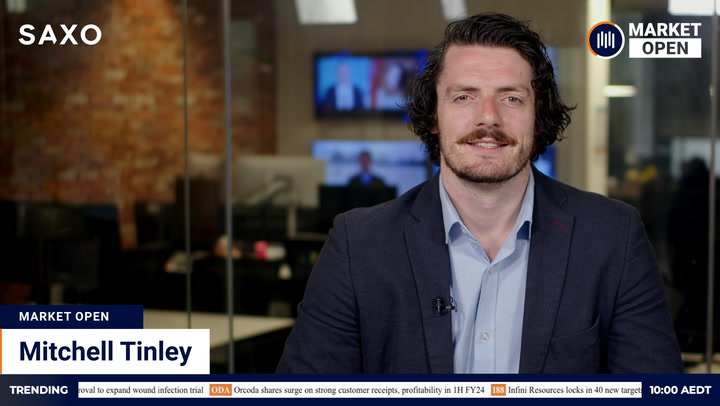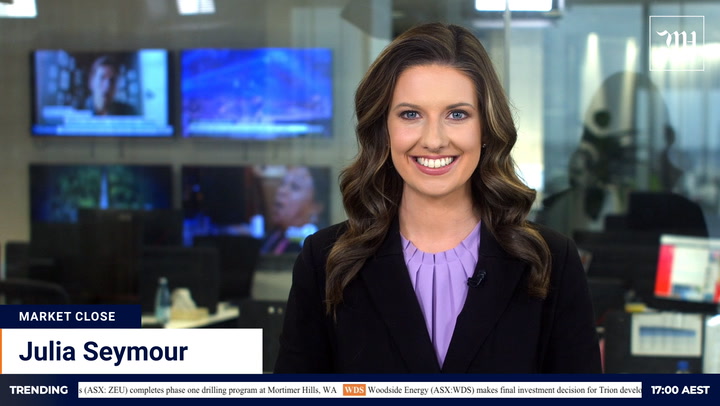The share market’s four-session winning run faces early pressure after weakening energy, bank and mining stocks dragged Wall Street into the red.
ASX futures declined 35 points or 0.49 per cent, signalling a retreat from yesterday’s two-week closing peak. The index claimed its second-highest close in 15 months yesterday, rising almost 1 per cent.
Overnight, crude and iron ore improved. Gold closed just shy of the key US$1,900 resistance level. Copper declined. The dollar was broadly steady at 77.52 US cents.
Wall Street
Wall Street’s win streak drifted to a lacklustre end on a night short of catalysts. The S&P 500 eased nine points or 0.21 per cent. The Dow Jones Industrial Average gave up 82 points or 0.24 per cent after earlier rising more than 100 points. The Nasdaq Composite closed almost flat, down four points or 0.03 per cent.
The major indices had rebounded strongly over the last few sessions from the latest flare-up of inflation worries. Treasury yields declined for a fourth night, signalling investors were less worried about inflationary pressures as consumer confidence and housing sales data eased from red-hot levels. The ten-year yield fell to 1.556 per cent, a two-week low. Real estate and other bond proxies rallied.
The next question, according to some commentators, is exactly when a recent run of strong economic data forces the Federal Reserve to reduce stimulus spending. Overnight, Fed officials talked down the threat from inflation. San Francisco Federal Reserve President Mary Daly said the central bank was “talking about talking about tapering“, but policy was currently “in a very good place”.
“The market is basically in a holding pattern until the next big event, which is the Fed’s tapering schedule (or not tapering schedule),” Tom Essaye, founder of Sevens Report, wrote. “Until we have more clarity on Fed tapering and the longer-term outlook for inflation, we should expect this type of incremental volatility.”
Energy was the biggest drag on the index, falling 2.04 per cent. Reopening stocks outperformed for a second day after US Covid numbers fell to 11-month lows. Airline stocks were boosted by reports of a strong rebound in yields. Cruise lines also moved higher.
Crypto trading platform Coinbase bounced 7.59 per cent as Bitcoin steadied above US$37,00. The largest of the digital coins was lately down 3.65 per cent at US$37,577. Tesla dipped 0.29 per cent.
Australian outlook
The local market has made back most of last week’s inflation/crypto-fuelled losses, but looks ripe for a breather today after rising for four straight sessions. The S&P/ASX 200 climbed 69 points or 0.98 per cent yesterday to extend its recovery since last Wednesday’s plunge to 183.5 points.
The market showed minimal reaction yesterday to the reintroduction of limited Covid restrictions in Greater Melbourne. However, the announcement late yesterday of another four cases – increasing the cluster to nine – is an unwelcome development. Travel stocks will once again be in the spotlight this session.
There were no major themes to last night’s US action, just a gentle downward drift in a market short of reasons to buy or sell after three days of gains. A slab of economic data tomorrow night should give the market fresh impetus one way or the other.
The two sectors that matter most on the ASX – financials and materials – were among the biggest drags in the US, falling 0.96 and 0.88 per cent, respectively. Consumer discretionary (airlines, cruise companies) and real estate were the best performers, rising 0.33 and 0.31 per cent.
Quarterly construction figures – a key input into GDP calculations – are due at 11.30 am AEST.
Commodities
Iron ore bounced after diving almost 6 per cent on Monday. The spot price for ore landed in China rose $3.40 or 1.8 per cent to US$191.65 a tonne. BHP’s US-listed stock sank 1.56 per cent. Its UK-listed stock fell 1.59 per cent. Rio Tinto gave up 1.88 per cent in the US and 1.45 per cent in the UK.
Gold neared US$1,900 an ounce after data misses on housing and consumer confidence dampened the argument for higher rates. Gold for June delivery settled $13.50 or 0.7 per cent ahead at US$1,898 an ounce after rising as high as US$1,899.40. The NYSE Arca Gold Bugs Index dropped 0.26 per cent.
Most industrial metals retreated as China’s threat to crack down on market manipulation depressed speculative buying. Benchmark copper on the London Metal Exchange retreated 0.3 per cent to US$9,900.50 a tonne. Prices peaked at a record US$10,747.50 earlier this month, but have since fallen 7 per cent.
Aluminium declined 0.7 per cent, nickel 0.4 per cent and tin 0.2 per cent. Lead gained 1.4 per cent and zinc 1.1 per cent.
Oil inched higher as traders awaited clarity on negotiations over Iran’s nuclear program. Brent crude settled 12 cents or 0.2 per cent ahead at US$68.49 a barrel.







